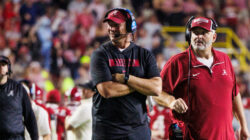
As kids, Bo Rein and his brother Paul would listen to LSU football games on the radio every Saturday night. When Bo took over the Tigers in 1980, he pledged to return the program to its dominant form of the 1950s, an era he recalled so fondly while growing up a thousand miles away in Niles, Ohio.
Only 42 days into his dream job, life had other plans for Rein.
The SEC Network rolled out its latest installment of its documentary series “SEC Storied” on Sept. 15 with “The Bo You Don’t Know.” The hour-long film documents the meteoric rise of Bo Rein, from high school standout and Ohio State star, to innovative coordinator and the supposed future of LSU football.
Rein starred at Ohio State, leading the program in receiving and rushing — as well as helping guide the Buckeyes to their only College World Series title. After an Achilles injury ended his playing career in his final exhibition game with the Baltimore Colts, Rein turned toward coaching and found himself in a lineage of greatness that continues to reach through generations of football.
Rein was killed in a small plane crash while recruiting a little more than a month after taking the LSU job. But not before he left an indelible mark on college football.
Rein got his coaching start with Ohio State under Woody Hayes. There he met and followed Lou Holtz to William and Mary, and eventually North Carolina State. In Raleigh, Holtz and Rein took the nation by storm with one of the first versions of the spread offense.
Rein bounced to Arkansas as Razorbacks offensive coordinator under Frank Broyles and opposite of defensive coordinator Jimmy Johnson. He lasted in Fayetteville for one year before replacing his mentor Holtz at North Carolina State. With each stop his offenses continued to evolve and become more unstoppable.
After going 27-18-1 with the Wolfpack, Rein was the most sought-after coach in the nation. When LSU came calling, it appeared to be fate. But fate can be cruel and gives as equally as it takes.
The documentary hits you with the emotion right from the beginning and never lets up, hitting with a punch to the guy when a bleary-eyed Holtz quietly laments “LSU is a tremendous school. For Bo to go there was a good move for him. I thought he’d be very, very successful. But … uh … now I wish he hadn’t gone.”
We follow a small, but poignant, subplot of Rein’s wife Suzanne and daughter Linea as they make their first-ever trip to Tiger Stadium 35 years after his passing. The family’s story is eloquently told through Suzanne, Linea and brother Paul and is punctuated by Rein’s understudy Bill Cowher, who painfully recalls the night Rein’s aircraft took off from Shreveport bound for Baton Rouge. The plane climbed to an unsafe altitude, then veered off course before coming to its final resting place 1,000 miles away in the Atlantic Ocean.
“It was this good will of fate that they ended up going over Raleigh,” Cowher says in the documentary of the city where Rein’s wife and children still lived at the time. “It was almost his way of saying goodbye to his wife and kids.”
The strength of the documentary is the depth of the legendary and assistant coaches, journalists and family members that lent their time to share their tales of Rein, who left a giant “what if?” on the sport. As Paul Finebaum suggests in the documentary, Rein’s offensive genius was about to revolutionize the SEC and would have made him the conference’s Steve Spurrier years before the Head Ball Coach took over at Florida.
Life, however, had different plans for the man who never got to coach a single game on the LSU sidelines.
Chris Wuensch is a contributing writer for Saturday Down South. He covers South Carolina and Tennessee.







